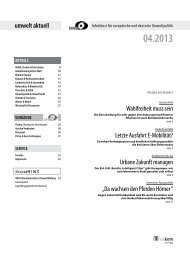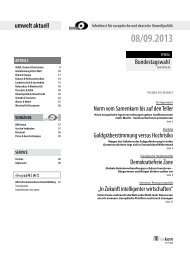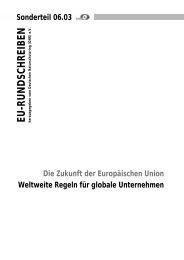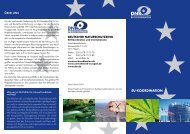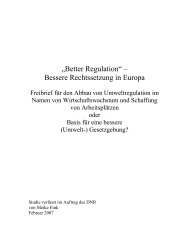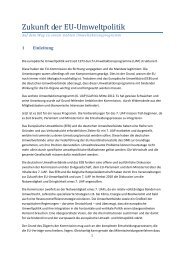Nachhaltiges Europa Abschlusspublikation - Global Marshall Plan
Nachhaltiges Europa Abschlusspublikation - Global Marshall Plan
Nachhaltiges Europa Abschlusspublikation - Global Marshall Plan
Sie wollen auch ein ePaper? Erhöhen Sie die Reichweite Ihrer Titel.
YUMPU macht aus Druck-PDFs automatisch weboptimierte ePaper, die Google liebt.
<strong>Nachhaltiges</strong> <strong>Europa</strong><br />
48<br />
cation system that, if reproduced globally, will<br />
have huge social impact.<br />
To be credible, global companies' social responsibility<br />
efforts must show that the companies have<br />
harnessed their ample resources to benefit society.<br />
Some may argue that corporations have no<br />
business expending resources on activities that<br />
lack a profit motive. That is short-sighted. If consumers<br />
believe that global companies must shoulder<br />
greater social responsibility, executives do not<br />
have much of a choice, do they?<br />
What can we do?<br />
The harsh effects of short term reactions to globalisation<br />
can be mitigated in two main ways:<br />
• private actions: consumer intolerance of poor<br />
supply chain conditions – CSR companies realising<br />
behaving responsibly is enlightened self-interest.<br />
• governance, institutional, rules and frameworks:<br />
prosperity drags up standards, international<br />
agreements push standards up, trade and<br />
other incentives provide some push.<br />
And against that background the EU has a<br />
Sustainable Development strategy framework with<br />
a host of individual actions that are pushing in the<br />
same direction.<br />
But ultimately it comes back to borders – you can<br />
no longer aim for a sustainable „wohlhabendere<br />
und gerechtere Gesellschaft” behind the protective<br />
borders of nation or region, whilst the rest of the<br />
world goes hang. <strong>Global</strong>ization means that you<br />
have to be concerned about economic and social<br />
conditions everywhere. You have to be concerned<br />
to build a society that others will want to emulate<br />
and reproduce. It’s largely happening. Exclusive-<br />
ness is out.<br />
How to do it?<br />
The Commission believes that three major imbal-<br />
ances result from the acceleration of the globalisation<br />
process:<br />
• imbalance between the rapid process of liber-<br />
alisation and the time necessary to elaborate the<br />
international regulatory framework for these exchanges;<br />
• imbalance between the advanced governance<br />
systems in industrialised countries, and the lack of<br />
such governance in developing countries as well as<br />
at international level;<br />
• imbalance between the highly developed economic<br />
pillars of global governance (IMF, World<br />
Bank, WTO) and the embryonic state of the social<br />
and environmental pillars of such a system.<br />
“Classical” trade measures such as duties, levies<br />
and quotas are on the way out, but procedures,<br />
rules and norms play an ever-greater role.<br />
1. On the private action side Corporate Social<br />
Responsibility (CSR) is a concept whereby companies<br />
integrate social and environmental concerns<br />
in their business activities and in interaction<br />
with their stakeholders on a voluntary basis<br />
("triple bottom line"). Voluntary social and environmental<br />
practices of business, going beyond<br />
companies' existing legal obligations, can play a<br />
major role in filling the governance gap in an innovative<br />
way. CSR is not a substitute, but a complement<br />
to hard law. As such it must not be<br />
detrimental to public authorities' task to establish<br />
binding rules, at domestic and/or at international<br />
level, for the respect of certain minimum social<br />
and environmental standards.<br />
There has been some debate in this respect about<br />
whether voluntary or binding instruments are<br />
called for, latterly this debate has moved on to-<br />
wards the broader challenge of devising reporting<br />
tools and verification mechanisms to ensure that<br />
companies are doing what they say they are<br />
doing. If they do not do what they say they are<br />
doing and if this becomes known, there are plenty<br />
of you out there who will make their life uncom-<br />
fortable until they do better.<br />
Corporate Social Responsibility is a business contribution<br />
to Sustainable Development. In a<br />
development context, it provides a tool to reach<br />
the Millennium Development Goals and contributes<br />
to poverty reduction and Sustainable Development.<br />
CSR is however not a substitute but a com-<br />
plement to norms. CSR is a useful tool in “harnessing<br />
globalisation”, which can be used in combination<br />
with international and domestic regula-<br />
tions. Corporate Social Responsibility elements in<br />
trade instruments are progressively developed.<br />
The OECD Guidelines for Multinational Enterprises<br />
that were fully renewed in 2000 are part of the<br />
global architecture of CSR policy tools and have a<br />
special role to play since they allow a certain levelplaying<br />
field and involve public authorities in their<br />
implementation mechanism.<br />
2. The OECD Guidelines for Multinational Enterprises<br />
also play a significant role. In 2000, a<br />
number of drivers were pushing for the amelioration<br />
of the Guidelines:<br />
– The Commissioner for Trade wanted to work to-<br />
wards a “globalisation with a human face”. This<br />
implied assessing the impact of trade policies,<br />
which further developed into the systematisation<br />
of Sustainable Impact Assessments (SIAs), and



